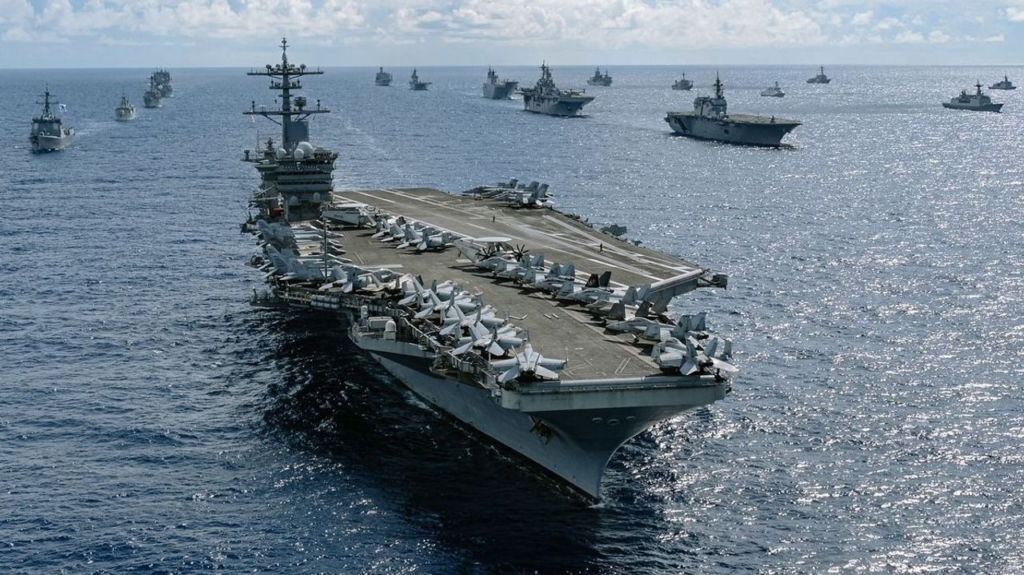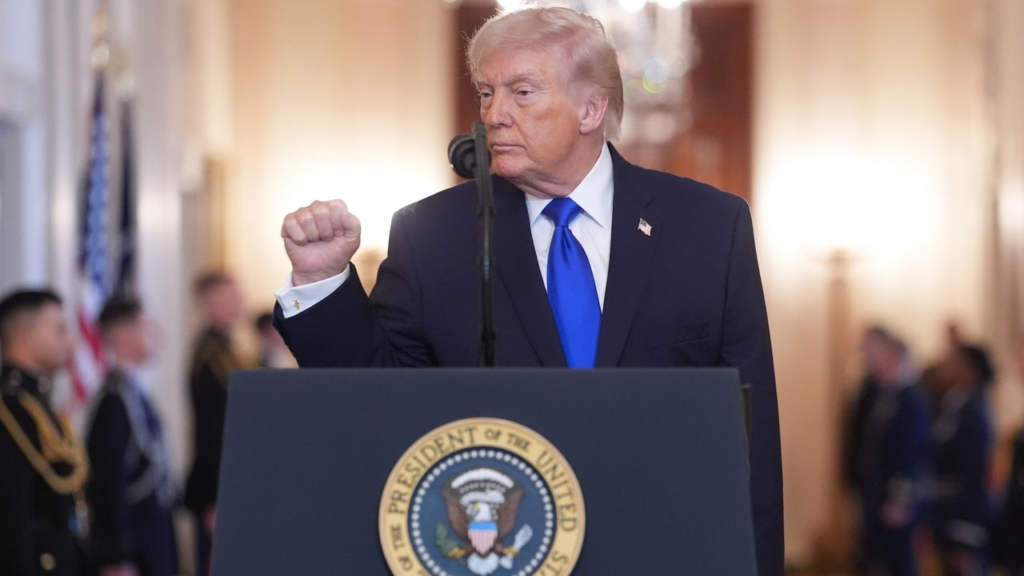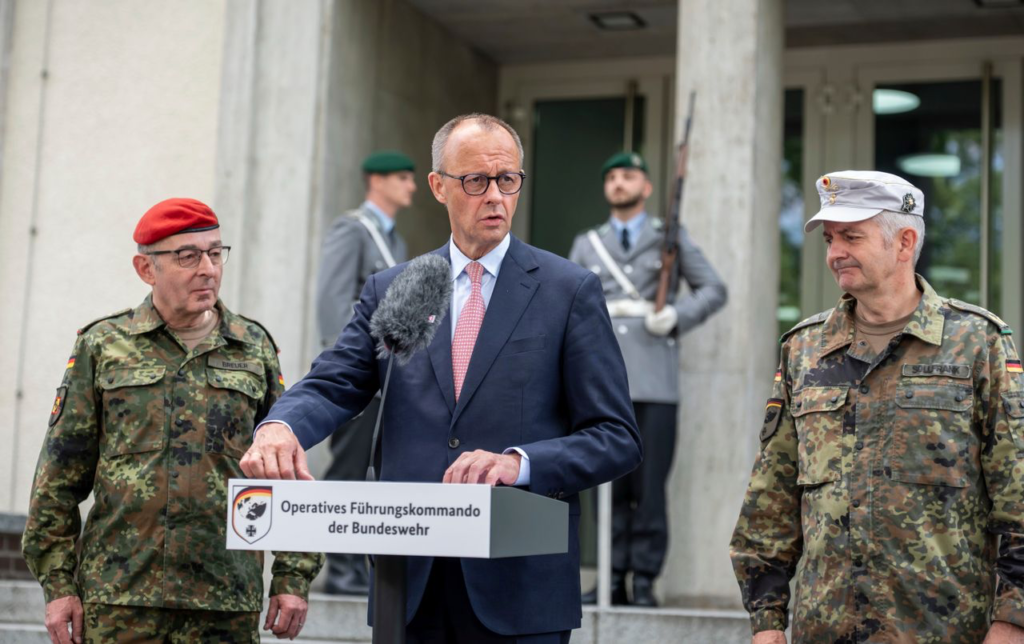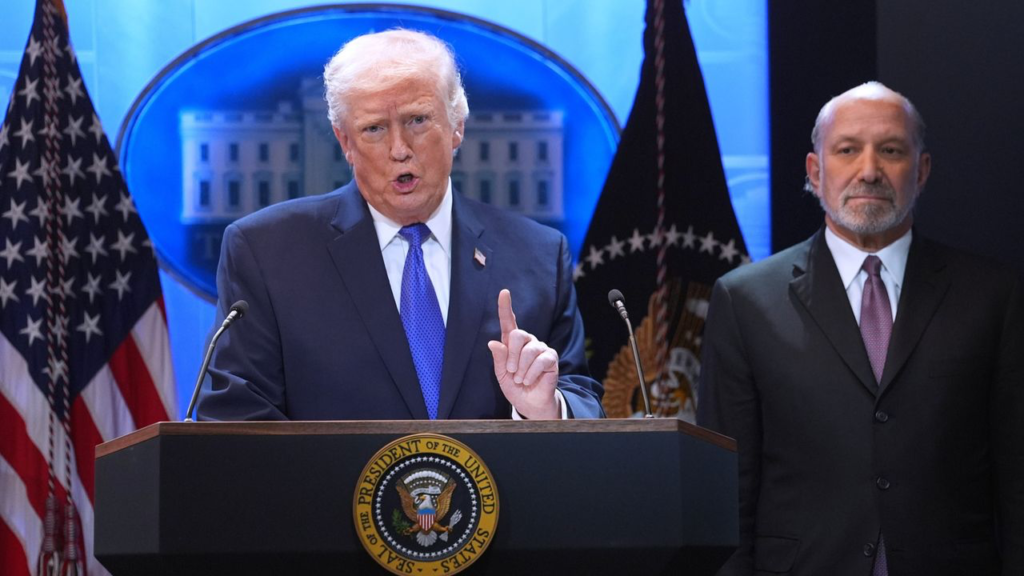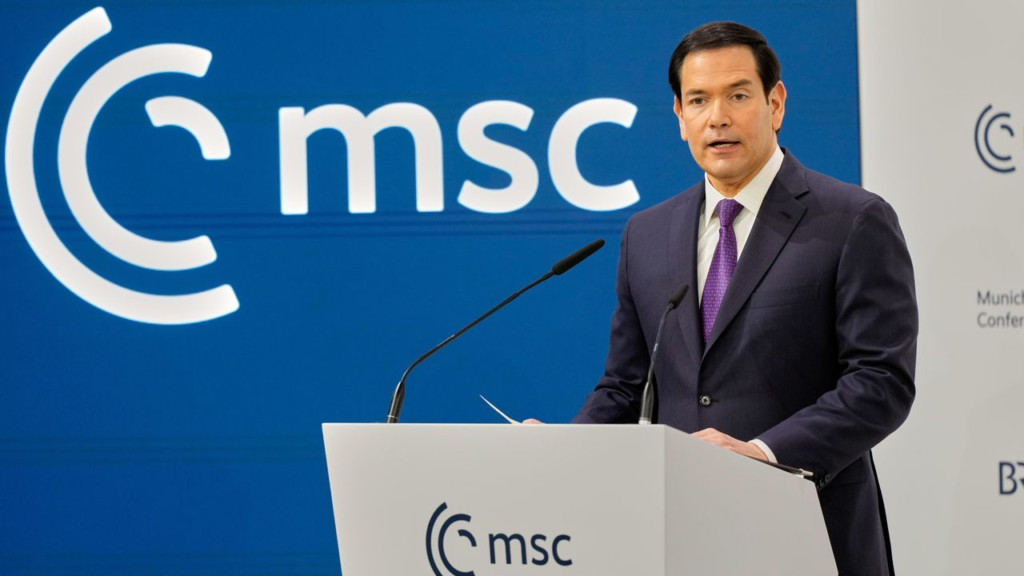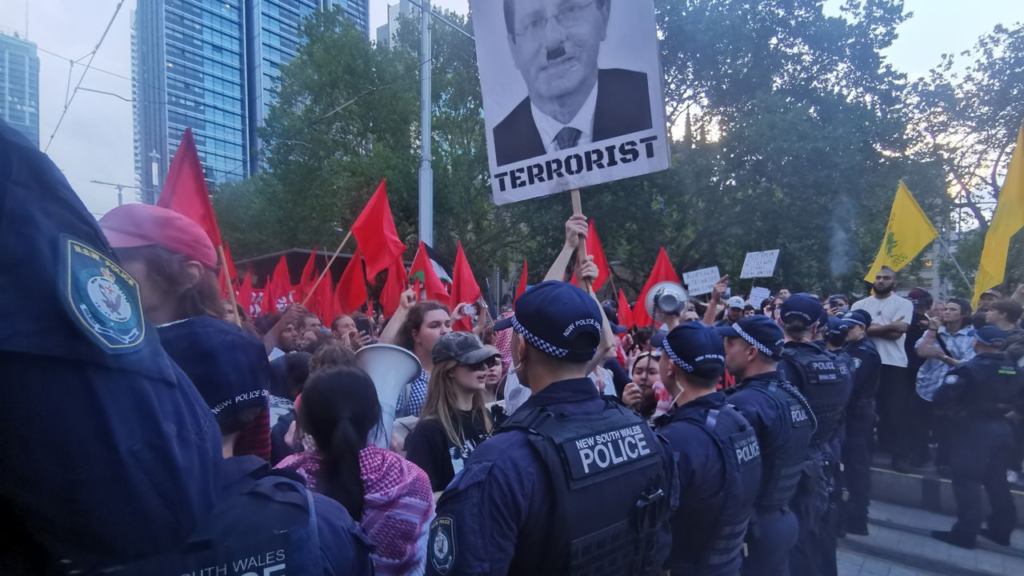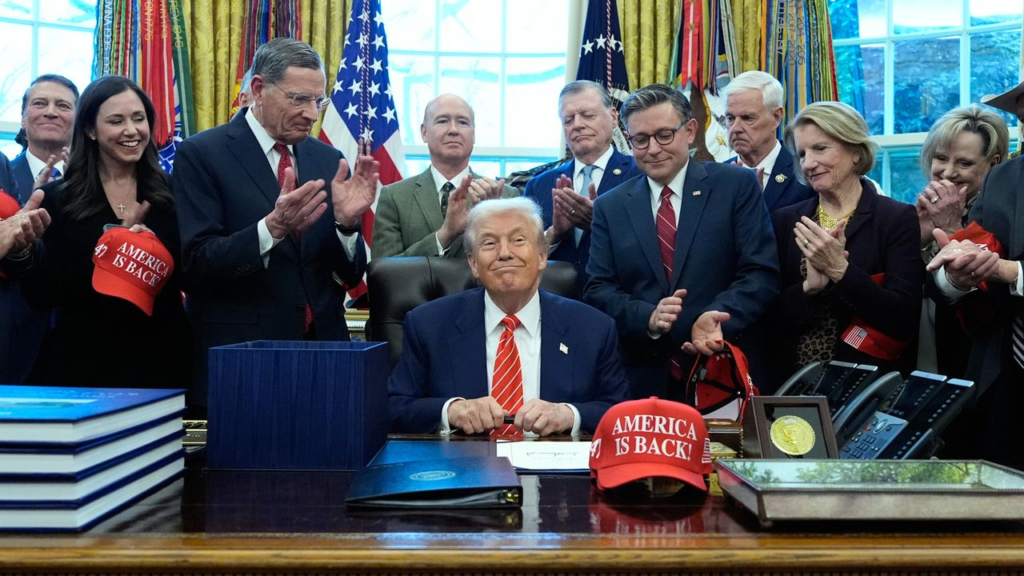ට්රම්ප් කොංග්රසයේ දී කළ ෆැසිස්ට්වාදී කතාවට සමාජවාදී සමානතා පක්ෂය (එ.ජ) පිළිතුරු දෙයි
ඩේවිඩ් නෝර්ත් විසිනි.
මෙහි පළවන්නේ ලෝක සමාජවාදී වෙබ් අඩවියේ (WSWS) 2026 පෙබරවාරි 25 වන දින ‘The Socialist Equality Party replies to Trump’s fascist address to Congress’ යන හිසින් පළවූ ඩෙවිඩ් නෝර්ත් විසින් ඉදිරිපත් කළ කතාවේ සිංහල පරිවර්තනය යි.
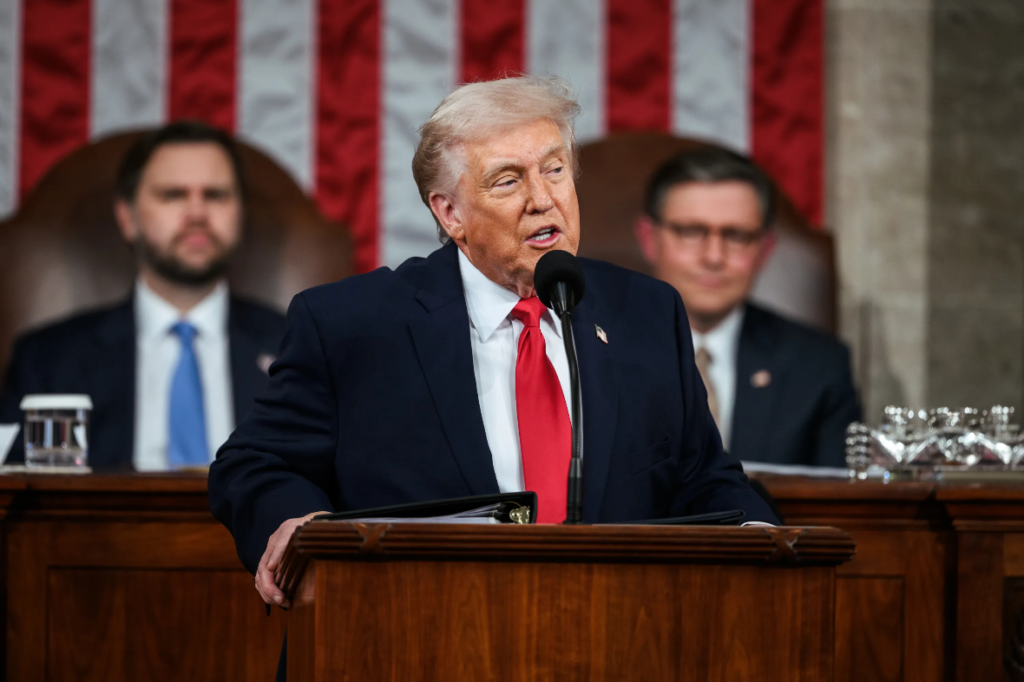
ධනවාදී ද්වි-පක්ෂ ක්රමය වසර 150ක් තිස්සේ ක්රියාත්මක වන එක්සත් ජනපදයේ, පාලක පන්තියේ ප්රතිපත්ති සහ අවශ්යතාවලට සැබවින්ම විරුද්ධ වන සියලු දෙනාටම ජනතාව ඇමතීමේ අයිතිය අහිමි කරනු ලැබ තිබේ. කෙසේ වෙතත්, ට්රම්ප්ගේ රාජ්ය තත්ව දේශනයට පමණක් නොව, ඩිමොක්රටික් පක්ෂයේ ඊට පිළිතුරට ද රූපවාහිනී මගින් කරන ප්රතික්ෂේප කිරීමක් කිරීමට සමාජවාදී සමානතා පක්ෂයට අවස්ථාව ලබා දී තිබුනේ නම්, අපි කියන්නෙ මෙයයි.
***
සුභ සන්ධ්යාවක්. රාජ්ය තත්වය පිළිබඳ අපගේ තක්සේරුව ඉදිරිපත් කිරීමට ලැබෙන මෙම දුර්ලභ අවස්ථාව සමාජවාදී සමානතා පක්ෂය සාදරයෙන් පිළිගනී.
සසප නියෝජිතයෙකු ලෙස කතා කරමින්, මම මෙම ප්රකාශයන් මගින් අමතනු ලබන්නේ, එක්සත් ජනපදයේ කම්කරුවන්ට සහ තරුණයින්ට පමණක් නොව, ලොව පුරා සිටින අපගේ පන්ති සහෝදර සහෝදරියන්ට ය. ඔබ අපගේ සතුරන් නොවේ. ධනේශ්වර ක්රමයේ අර්බුදය විසඳීම සඳහා මංමුලා සහගත උත්සාහයක් ලෙස බල-උමතු කතිපයාධිකාරය විසින් දියත් කරන ඕනෑම යුද්ධයකට ඇමරිකානු වැඩ කරන ජනතාව විරුද්ධ වන අතර කිසිදු අයුරකින් එයට සහභාගී වීමට ඔවුන් කැමති නැත.
ඔබ නැරඹූ දේ–ඔබට දරාගත හැකි වී නම්–විකෘතරූපී හා ආත්මගෞරවය කෙලෙසන දසුනකි. පැය දෙකකට ආසන්න කාලයක් ට්රම්ප් වෛරය, තර්ජන සහ අමනාපය වගුරුවමින් සිටියා. ස්පීල්බර්ග්ගේ ලින්කන් පිළිබඳ සිනමා චරිතාපදානයේ, ශ්රේෂ්ඨ රැඩිකල් නායක තැඩියස් ස්ටීවන්සන් (Thaddeus Stevens) පිළිකුල් සහගත ප්රතිගාමී කොන්ග්රස් සභිකයෙකුට බැණ වදින දර්ශනයක් තිබේ. ස්ටීවන්ස් ප්රකාශ කරන පරිදි, ඔහු “සදාචාරයේ මළකඳකි … මිනිසෙකුට වඩා උරගයෙකි.” ට්රම්ප් හිස ඉහළට සහ පහළට වනමින්, කටුස්සෙකුගෙ වැනි තොල් ලෙවකමින් සහ ඔහුගේ ගොබ්බ කතා කටින් පිට කරන ආකාරය දුටු විට, ස්ටීවන්ස්ගේ වචන මගේ මතකයට නැගුනි.
ඒ සමගම එහි කොංග්රස් කොංග්රස් සභික සභිකාවියන් ද සිටියහ. කිහිප දෙනෙකු හැර, ඔවුන් තවත් ශ්රේෂ්ඨ ඇමරිකානුවෙකු වන මාර්ක් ට්වේන් (Mark Twain) ගේ වචන සනාථ කරයි: “කොංග්රසය හැර වෙනත් පැහැදිලිව ස්වදේශිකවූ ඇමරිකානු අපරාධ පන්තියක් නොමැති බව කරුණු සහ සංඛ්යාලේඛන මගින් බොහෝ විට පෙන්විය හැකිය.”
එක් පැත්තක රිපබ්ලිකන් ෆැසිස්ට්වාදීන් රංචුවක් වාඩි වී සිටි අතර, ඔවුන්ගේ Führer [හිට්ලර්] හුස්ම ගැනීම සඳහා විරාමයක් තබන සෑම අවස්ථාවකම ඔවුන්, එකවර පැන, නැගී සිටිමින් “Sieg Heil” (”ජය වේවා”) හි ඇමරිකානු අනුවර්තනය “USA, USA!” ලෙස කෑගසමින් ගොරවන්නට විය.
අනෙක් පැත්තෙන් ව්යාජ විපක්ෂය වන ඩිමොක්රටික් පක්ෂයේ බියගුලු නියෝජිතයෝ, තම ඔඩොක්කුවේ දෑත් බැඳගෙන, “අපේ රට විනාශ කරන,” “පිස්සු”, “රෝගී මිනිසුන්”, “වංචා කරන්නන්” ලෙස ඔවුන්ව හැඳින්වූ මිනිසෙකුගෙන් පැය දෙකකට ආසන්න කාලයක් විවෘත අපහාස, බැණ වැදීම් සහ උසිගැන්වීම් විඳදරා ගනිමින් වාඩි වී සිටියහ. එය අවසන් වූ පසු, ඔවුන් සභා ගර්භයෙන් පිටතට ගොස් මයික්රෆෝනය හිටපු සීඅයිඒ නිලධාරියෙකු වන ආණ්ඩුකාර අබිගේල් ස්පාන්බර්ගර් (Abigail Spanberger) වෙත භාර දුන් අතර, ඇය “වියදම් දැරිය හැකි බව” සහ “දක්ෂ කළමනාකරණය” පිළිබඳ නිදිමත ඇති කරන ආකරයේ නිෂ්ප්රභා කිරීමක් ඉදිරිපත් කළේය.
2026 දී ඇමරිකානු ප්රජාතන්ත්රවාදයේ තත්වය මෙයයි. ෆැසිස්ට් ජනාධිපතිවරයෙක් සහ කීකරු විපක්ෂයක්. එය, කොල්ලය කළමනාකරණය කරන්නේ කුමන කන්ඩායමද යන්න මත පමණක් බෙදී ඇති, ලාභය ආරක්ෂා කිරීම, යුද්ධ කිරීම, කම්කරු පන්තිය මර්දනය කිරීම යන අත්යවශ්ය දේවලින් එක්සත් වූ පාලක පන්තියකි.
පෙර දින රාත්රියේ ඒ කාමරේ සිටි කිසිවෙක් ඔබ වෙනුවෙන් කතා කළේ නැත.
ෆැසිස්ට්වාදයට එරෙහි, අධිරාජ්යවාදී යුද්ධයට එරෙහි, බිලියනපති කතිපයාධිකාරයේ ආඥාදායකත්වයට එරෙහි සටන, කැපිටල් හි කිරිගරුඬ කොරිඩෝවෙන් නොපැමිණෙනු ඇත. එය පැමිණෙනු ඇත්තේ පහලිනි–එනම්,කර්මාන්තශාලා, ගබඩා, රෝහල්, පාසල්, වැඩ කරන ජනතාව සැබවින්ම ජීවත් වන සහ වැඩ කරන නිවහන් ප්රදේශ වලිනි. එය සමාජවාදී වැඩපිළිවෙලක පදනම මත කම්කරු පන්තියේ ස්වාධීන දේශපාලන බලමුලු ගැන්වීමකින් පැමිණෙනු ඇත. නැතහොත් එය කිසිසේත්ම පැමිනෙනු නැත.
ට්රම්ප්ගේ කතාව අමූලික බොරු පොදියක් විය. ආර්ථිකය “පෙර නොවූ විරූ ආකාරයකින් වේගයෙන් වර්ධනය වෙමින් ප්රසාරනය වන ” බවත් “මිල ගණන් කඩා වැටෙමින් පවතින” බවත් ඔහු ප්රකාශ කළේය. පුනරුච්චාරණය මගින් ප්රචාරණය යථාර්ථයක් බවට පත් කළ හැකි යයි හඟින්නා සේ, ඔහු පෙට්රල් මිල ගණන් සහ හදිසියේ පහළ වූ ආයෝජන පොරොන්දු ගැන පුරසාරම් දෙඩුවේ, රැකියා, වැටුප් සහ තීරුබදු පිළිබඳ තෝරාගත් සහ විකෘති කරන ලද සංඛ්යා මාලාවක් ඉදිරිපත් කරමිනි. මෙය, සෑම කම්කරුවෙකු ම දන්නා කරුණු–එනම්, මූලික අවශ්යතා සඳහා මිල ගණන් දැරිය නොහැකි බවත්, සමාජය කොල්ලකෑමට ලක්වන අතර බිලියනපතියන් මහජන මුදල් ගිජු ලෙස ගිල දමන බවත්–වසන් කිරීම අරමුණු කරගත් මූල්ය කතිපයාධිකාරය වෙනුවෙන් ඉදිරිපත් කරන ලද විකුණුම්කරුවෙකුගේ අලෙවිකරණය පිළිබඳ උස් ස්වරයකි.
තම ICE නියෝජිතයන් විසින් මිනියාපොලිස් හි රෙනී නිකොල් ගුඩ් සහ ඇලෙක්ස් ප්රෙට්ටි ඝාතනය සිදු කරනු ලැබ තිබියදීත්, ඔහුගේ පරිපාලනය මගින් එම ඝාතන සාධාරණීකරණය කරනු ලැබ තිබියදීත් සහ ඔහුගේ උප ජනාධිපති විසින් ගුඩ්ගේ මරණය “ඇය විසින්ම නිර්මාණය කරන ලද ඛේදවාචකයක්” බව ප්රකාශ කරනු ලැබ තිබියදීත්, කොංග්රසය ඉදිරියේ පෙනී සිටි ජනාධිපතිවරයා ඔවුන් ගැන එක වචනයක්වත් කතා කළේ නැත. ඒ වෙනුවට, “ඇමරිකානු රජයේ පළමු රාජකාරිය වන්නේ නීතිවිරෝධී විදේශිකයන් නොව ඇමරිකානු පුරවැසියන් ආරක්ෂා කිරීම” බව තහවුරු කරන ලෙස ඔහු ඉල්ලා සිටි විට, ඒ වෙනුවෙන් නැගී සිටීම ප්රතික්ෂේප කිරීම ගැන ඩිමොක්රටික් පක්ෂය උපහාසයට ලක්කරමින් අවුස්සනු ලැබීය.
ඔහු මිනසෝටා හි සෝමාලි ප්රජාව ඇමරිකානු ජනතාවගෙන් බිලියන ගණනක් “කොල්ල කෑ” “මුහුදු කොල්ලකරුවන්” ලෙස හංවඩු ගසමින් වර්ගවාදී බොරු රාශියක් මුදා හැරියේය. හොලොකෝස්ටය [නාසි ජන සංහාරය] සඳහා අඩිතාලම දමන අතර නාසීන් යුදෙව්වන්ට එරෙහිව භාවිතා කළ භාෂාව මෙයයි. ට්රම්ප් “දූෂණය” ගැන කතා කරන්නේ, වෝල් වීදිය, පෙන්ටගන් කොන්ත්රාත්කරුවන් සහ නීතිය ලියන බිලියනපතියන් විසින් දිනපතා සිදු කරන ලද කොල්ලකෑම් සම්බන්ධයෙන් නොව, වැටලීම්, සමූහ අත්අඩංගුවට ගැනීම් සහ නගර ෆෙඩරල් ආණ්ඩුව විසින් අත්පත් කර ගැනීම සඳහා කඩතුරාවක් නිර්මාණය කිරීමට ය. මිනියාපොලිස් හි සිදු කළ දේ වෙනත් තැන් වලද සිදු කරනු ඇති බවට ඔහු තර්ජනය කළේය.
“ඇමරිකාව බේරා ගැනීමේ පනත” යටතේ, ට්රම්ප් “නීති විරෝධී විදේශිකයන් සහ අනෙකුත් අය” ඡන්දය දීම තහනම් කිරීමට පියවර ගන්නා ලෙස ඉල්ලා සිටි අතර, කිසිදු සාක්ෂියක් නොමැතිව, “වංචා කිරීම බහුලව සිදුවන” බව ප්රකාශ කළේය. මෙය රිපබ්ලිකන් ජයග්රහණයක් ලබා නොදෙන ඕනෑම මැතිවරණ ප්රතිඵලයක් සුජාත නොවන බවට වන පූර්වගාමී ප්රකාශයකි. නාසි ජර්මනියේ ගෙස්ටාපෝ නියෝජිතයන් මෙන්, අනන්යතාව විමසන ICE විසින් අධීක්ෂණය කරන ලදුව, තුවක්කු බැරල යටතේ ඉදිරි මැතිවරණ පැවැත්වීමට ට්රම්ප් සූදානම් වන අතර, ඡන්දදායකයින් මර්දනය කිරීමට, බිය ගැන්වීමට සහ විරුද්ධ පක්ෂය අපරාධකරණය කිරීම සඳහා වන සැලැස්මකි.
ට්රම්ප්ගේ කතාව අධිරාජ්යවාදී මැරකම් හා ඇමරිකානු අධිරාජ්යවාදයට තම අභිමතය පරිදි ආක්රමණය කිරීමට, බෝම්බ දැමීමට, ඝාතනය කිරීමට සහ පැහැර ගැනීමට ඇති “අයිතිය” සැමරීමක් ද වෙයි. ඔහුගේ ප්රකාශ අතරතුර ඔහු වෙනිසියුලාවේ මිලිටරි ආක්රමණය–සිවිල් වැසියන් ඝාතනය කිරීම සහ එහි තේරී පත් වූ ජනාධිපතිවරයා පැහැර ගැනීම–අගය කළ යුතු ජයග්රහණයක් ලෙස සැලකීය. වැටලීමේදී තුවාල ලැබූ හෙලිකොප්ටර් නියමුවෙකුට ගෞරව පදක්කමක් ප්රදානය කළ ඔහු දඩයම් ගමනක් තලු මරා විස්තර කරන මිනිසෙකු මෙන් එම මෙහෙයුම විස්තර කළේය.
දෙවන ලෝක යුද්ධයෙන් පසු නියුරම්බර්ග් නඩු විභාගවලදී ස්ථාපිත කරන ලද ප්රමිතීන්ට අනුව, මෙය නීති විරෝධී “සාමයට එරෙහි අපරාධයක්” වන අතර එය නාසි විත්තිකරුවන් එල්ලුම් ගහට යැවූ ක්රියාවන්ට සමාන කළ හැකිය. නමුත් ට්රම්ප් පාලන තන්ත්රය සඳහා, ජාත්යන්තර නීතිය, ජාතීන්ගේ ස්වෛරීභාවය සහ යටත් කර ගැනීමෙ යුද්ධ තහනම, රාජ්ය ලේකම් මාර්කෝ රුබියෝ පැවසූ පරිදි, පසෙකට අතුගා දැමිය යුතු “වියුක්තයන්ය”. එක්සත් ජනපදය “ඔවුන්ගේ ධීවර කර්මාන්තයටද ඉතා බරපතල ලෙස හානි කර ඇත. කිසිවෙකු මසුන් ඇල්ලීමට යාමට කැමති නැත” යනුවෙන් ට්රම්ප් පුරසාරම් දොඩමින්, කැරිබියන් සහ පැසිෆික් කලාපයේ සිදු කරන ලද ධීවරයින්ගේ ඝාතන පිළිබඳ පරපීඩාකාමී කෲර-සතුටින් සඳහන් කළේය.
ගාසා තීරය පැවැත්මෙන් මකා දමා ඇත.”පලස්තීන” යන වචනය කතාවේ දක්නට නොලැබුණි. ඇමරිකානු අවි සහ දේශපාලනික සහ සැපයුම් සහාය ඇතිව, පිරිමින්, කාන්තාවන් සහ ළමුන් දස දහස් ගණනක් මරා දමා ඇත; රෝහල් විනාශ කර ඇත; විශ්ව විද්යාල සමතලා කරන ලදී; සිවිල් ජනතාවක් කුසගින්නේ හා බෝම්බ හෙලීමට ලක්ව ඇත. ට්රම්ප් මැදිහත්ව සමථ කළ බව කියන සටන් විරාමයට පටහැනිව ඊශ්රායලය ගුවන් ප්රහාර දිගටම සිදු කරයි. ඊනියා සටන් විරාමයෙන් පසු සිය ගණනක් මිය ගොස් ඇත. ජන සංහාරය ඉදිරියට යන අතර, එය සක්රීය කළ ජනාධිපතිවරයා එය විසඳා ඇති බව ප්රකාශ කර ඇත.
ඉරානය ගැන සඳහන් කිරීමට පෙර ට්රම්ප් මිනිත්තු 90 කට වඩා කතා කළේ, එක්සත් ජනපදය යුද්ධයක් දියත් කිරීමට සැලසුම් කරන්නේ ඇයි සහ කවදාද යන්න දැන ගැනීමට රටේ කිසිවෙකුට අයිතියක් නැති සෙයිනි. අවසානයේ, 2003 න් පසු මැද පෙරදිග විශාලතම එක්සත් ජනපද හමුදා යෙදවීම දැන් සිදුවෙමින් පවතිද්දී ඔහු ඉරානය ගැන සඳහන් කළේ වාක්ය කිහිපයක් පමණි; එම ප්රකාශ මගින් කිසිවක් පැහැදිලි නොකෙරුණි.
එක්සත් ජනපද සහ ජාත්යන්තර පාලක පන්තියේ ප්රමුඛ පුද්ගලයන් ගේ නාම ලේඛනයක් බදු වූ එප්ස්ටයින් ලිපිගොනු ගැන සඳහනක් නොවීය. බිලියනපතියන්, දේශපාලනඥයින්, බුද්ධිමතුන්, තාක්ෂණික විධායකයින් සහ රාජකීයයන් ආදී, වරදකරු කරන ලද ළමා ලිංගික ජාවාරම්කරුවෙකුගේ කක්ෂය හරහා භ්රමණය වූ ඇමරිකානු සහ ජාත්යන්තර ධනවාදී කතිපයාධිකාරයේ පරිහානියට පත් සමාජ විශ්වය හෙළිදරව් කරන පිටු මිලියන 3 කට අධික ලේඛන නිකුත් කෙරුණද, ඡායාරූප, ගුවන් ගමන් ලොග් සටහන් සහ සාක්ෂිකරුවන්ගේ සාක්ෂි මගින් ලේඛනගත කර ඇති, එප්ස්ටයින් සමඟ දශක ගණනාවක් තිස්සේ පැවති සමීප සම්බන්ධතාවයක් තිබූ ජනාධිපතිවරයා, කිසිවක් ප්රකාශ කළේ නැත. ට්රම්ප්ගේ කතාව පැවැත් වූ දිනයේදී, NPR පරීක්ෂණයක් වාර්තා කළේ, ට්රම්ප්ට චෝදනා එල්ල කරන එප්ස්ටයින් සම්බන්ධ වාර්තා අධිකරණ දෙපාර්තමේන්තුව විසින් ඉවත් කර හෝ රඳවාගෙන ඇති බවයි. ඉන්, රාජ්ය යාන්ත්රණය විසින් සිදු කරනු ලබන වසන් කිරීම අවධාරනය කරයි.
එප්ස්ටයින් ලිපිගොනු මගින් පරිහානිගතයන් ගෙන් සැදුම්ලත් පාලක පන්තියක් හෙළිදරව් කෙරේ. ක්ලින්ටන් සහ ට්රම්ප්, සමර්ස් සහ බැනන්, ලිබරල් ශාස්ත්රාලිකයන් සහ ෆැසිස්ට් ක්රියාකාරීන් ආදී වශයෙන් පක්ෂ දෙකම ඊට සම්බන්ධ වී ඇති බැවින් දෙපක්ෂයම ඒවා සාකච්ඡා කිරීමට කැමති නැත.
දැන් අපි ඩිමොක්රටිකයන් වෙත හැරෙමු. ඩිමොක්රටික් පක්ෂය විරුද්ධ පක්ෂයක් නොවේ. එය ඇමරිකානු පාලක පන්තියේ පක්ෂයකි. එහි කාර්යය වන්නේ සමාජ විරෝධය අවශෝෂණය කර උදාසීන කිරීම, කම්කරු පන්තියේ ස්වාධීන දේශපාලන ව්යාපාරය ඇවිරීම සහ ධනවාදයට කිසිදු අභියෝගයක් පහළින් මතු නොවන බව සහතික කිරීමයි.
පක්ෂයේ නිල පිළිතුර ලබා දුන්නේ සෙනෙට් සභිකයෙකු හෝ කොංග්රස් සභිකයෙකු විසින් නොව වර්ජිනියා ආණ්ඩුකාර අබිගේල් ස්පාන්බර්ගර් (Abigail Spanberger) විසිනි. සෑම විටම ඔවුන්ගේ විකල්ප විවෘතව තබා ගනිමින්, බර්නි සැන්ඩර්ස් හෝ ඇලෙක්සැන්ඩ්රියා ඔකාසියෝ-කෝර්ටෙස්, ට්රම්ප්ට ඩිමොක්රටික් පක්ෂ ප්රතිචාරය දැක්වීම සඳහා බල කර ඉල්ලා සිටියේ නැත.
පුරෝකථනය කළ හැකි පරිදි, ඩිමොක්රටික් පක්ෂය, හිටපු සීඅයිඒ ක්රියාකාරිනියක් [පිළිතුරු කතාව සඳහා] ඉදිරිපත් කළ අතර, ඇය ඇගේ බුද්ධි අංශ අක්තපත්ර කැඳවා ගනිමින් ට්රම්ප් “චීනයට වාසි ලෙස ආර්ථික බලය සහ තාක්ෂණික ශක්තිය පවරා දෙන” බවත් “රුසියානු ඒකාධිපතියෙකුට හිස නමන” බවත් සඳහන් කරමින් අනතුරු ඇඟවූ අයෙකි. එම පණිවිඩය වැඩ කරන ජනතාව ඉලක්ක කර ගෙන නොව පාලක පන්තිය වෙත යොමු කරන ලද්දකි: අපි විශ්වාසදායකයි, අපි බැරෑරුම්, අපට වැඩි නිපුණතාවයකින් සහ වඩා අඩු මහජන විපිළිසර වීම් ඇතිව අධිරාජ්යය පවත්වාගෙන යාමේ හැකියාව තිබේ.
ස්පාන්බර්ගර් නොකියූ දෙය වනාහි ස්වයං-චෝදනා පත්රයකි. ඇය ICE අහෝසි කරන ලෙස ඉල්ලා සිටියේ නැත. ඇය රෙනී ගුඩ් හෝ ඇලෙක්ස් ප්රෙට්ටිගේ නම් සඳහන් කළේ නැත. ඇය වෙනිසියුලාව ආක්රමණය කිරීම හෝ ගාසා තීරයේ ජන සංහාරය හෙළා දුටුවේ නැත. ඇය ඩොලර් ට්රිලියන ප්රමාණයේ මිලිටරි අයවැයට හෝ සමාජ වැඩසටහන් කපා දැමීම අභියෝග කළේ නැත.
ඩිමොක්රටික් පක්ෂය මර්දනයේ සහ යුද්ධයේ යන්ත්රයට විරුද්ධ නැත. ඔවුන් විරුද්ධ වන්නේ ට්රම්ප් එය ක්රියාත්මක කරන රළු ආකාරයට පමණි.
ඒකාධිපතිත්වයක් ස්ථාපිත කිරීම සඳහා ට්රම්ප්ට ඩිමොක්රටික් දේශපාලනඥයින් කායිකව තලා දැමීමට අවශ්ය නොවේ. සැලකිය යුතු දෙයක් නම්, ඩිමොක්රටික් කොංග්රස් සභිකයෙකු වන අල් ග්රීන් (Al Green), ට්රම්ප්ගේ වර්ගවාදය හෙළා දකින පුවරුවක් ඔසවාගෙන සිටියදී ආරක්ෂකයින් විසින් ඔහුව සභා ගර්භයෙන් ඇදගෙන යද්දී ඔහුගේ පක්ෂ සගයන්ගේ කිසිදු විරෝධයක් පල නොවීමයි.
කොංග්රස් සභාවේ යල් පැන ගිය ක්රියා පටිපාටිවලට හානි කරන කුමන හෝ දෙයක් කළහොත්, එය ඔවුන්ට පාලනය කළ නොහැකි මහජන විරෝධය සහ මහා කම්කරු පන්ති ක්රියාමාර්ග දිරිමත් කරනු ඇතැයි ද, එය ධනේශ්වර ක්රමයට තර්ජනයක් වනු ඇතැයි ද ඩිමොක්රටික් පක්ෂය බිය වෙයි.
කම්කරු පන්තිය තමන් වෙනුවෙන් කතා කළ යුතුය
ආණ්ඩුකාර ස්පාන්බර්ගර් ඇගේ ප්රකාශය ආරම්භ කළේ, එක්සත් ජනපදය පදනම් වී ඇත්තේ ” රජයෙන් වඩා හොඳ දේ ඉල්ලා සිටීම සදහා ජනතාවට එකට එකතු විය හැකිය” යන අදහස මත බව පවසමිනි.
එය බොරුවකි. බියගුල්ලෙකු නොවන තෝමස් ජෙෆර්සන් ඇත්ත වශයෙන්ම ලිව්වේ පීඩාකාරී රජයකට මුහුණ දෙන විට, “එය වෙනස් කිරීමට හෝ අහෝසි කිරීමට සහ නව රජයක් පිහිටුවීමට ජනතාවට අයිතිය ඇති ” බවයි. එක්සත් ජනපදයේ පුරෝගාමී ආරම්භකයින් (The Founders) III වන ජෝර්ජ් රජුගෙන් “වඩා හොඳ දෙයක් ඉල්ලා සිටියේ” නැත. ඔවුන් නිදහස ප්රකාශ කර වසර අටක විප්ලවවාදී යුද්ධයක් දියත් කළහ. අද දින කම්කරු පන්තියට පන්නරය ලබා දිය යුතු සම්ප්රදාය එයයි.
වසර දෙසිය පනහකට පසු, කම්කරු පන්තියේ ඉල්ලීම ට්රම්ප් හෝ ඩිමොක්රටික් පක්ෂය “වඩා හොඳින් කටයුතු කළ යුතුය” යන්න නොවිය යුතුය. ස්වයං-මුළාවේ දේශපාලනයෙන් බිඳී යාමට කාලය පැමිණ තිබේ.
ඊයේ රාත්රියේ සිදු වූ දර්ශනයෙන් ඉගෙන ගත හැකි කේන්ද්රීය පාඩම නම්, ඇමරිකානු ධනවාදයේ දේශපාලන ක්රමය තුළ කම්කරු පන්තියට හඬක් නොමැති බවයි. පක්ෂ දෙකෙන් එකකින් වත් ඔබේ අවශ්යතා නියෝජනය නොවේ. පක්ෂ දෙකෙන් එකකින් වත් ඔබේ අයිතිවාසිකම් ආරක්ෂා නොවේ. නිල දේශපාලනයේ සමස්ත රාමුවම පවතිනුයේ, කම්කරු පන්තිය තමන් පන්තියක් ලෙස හඳුනා ගැනීමෙන්, ස්වාධීනව සංවිධානය වීමෙන් සහ එය සූරාකන පන්තියට එරෙහිව තමන්ගේම අවශ්යතා සඳහා සටන් කිරීමෙන් වැළැක්වීම සඳහා ය.
මෙය වෙනස් විය යුතුයි. කම්කරු පන්තිය තමන් වෙනුවෙන් කතා කළ යුතුයි.
සමාජවාදී සමානතා පක්ෂය කැඳවුම් කරන්නේ:
ICE සහ සංක්රමණික භීෂණයේ සමස්ත යාන්ත්රණයම අහෝසි කිරීම. සංක්රමණික සේවකයින් ඇමරිකානු කම්කරු පන්තියේ සතුරන් නොවේ. ඔවුන් ජාත්යන්තර කම්කරු පන්තියේ කොටසකි. සංක්රමණිකයින් බිල්ලට ගැනීම පාලක පන්තියේ අවි ගබඩාවේ ඇති පැරණිතම අවියයි; සූරාකන්නන්ට එරෙහිව සූරාකෑමට ලක්වන අයගේ එකමුතුකම වැළැක්වීම සඳහා වාර්ගික හා ජාතික බෙදීම් හිතාමතාම වගා කිරීම සිදු කරනු ලබයි. සියලුම සංක්රමණිකයින් හට පූර්ණ පුරවැසි අයිතිවාසිකම් සඳහා අපි බලකර සිටිමු.
රෙනී ගුඩ් සහ ඇලෙක්ස් ප්රෙට්ටිගේ ඝාතන කම්කරු පන්තියේ කමිටු විසින් ස්වාධීනව විමර්ශනය කළ යුතුය. උණ්ඩ පත්තු කළ නියෝජිතයන්ගේ සිට නියෝග ලබා දුන් නිලධාරීන් දක්වා වගකිව යුතු අය යුක්තිය හමුවට පමුණුවා ගත යුතුය.
අධිරාජ්යවාදී මිලිටරි මෙහෙයුම් සියල්ල වහාම අවසන් කිරීම. මැද පෙරදිගින් සෑම සොල්දාදුවෙක්ම ඉවත් කරනු. කියුබාව අවහිර කිරීම අවසන් කරනු. වෙනිසියුලාවේ වාඩි ලෑම අවසන් කරනු. ඉරානයට එරෙහි යුද්ධයට සූදානම් වීම නවත්වනු. ඇමරිකානු අධිරාජ්යවාදයේ කොල්ලකාරී අවශ්යතා සඳහා එක් ඩොලරයක්වත්, එක් ජීවිතයක්වත් ලබා නොදෙනු. ඩොලර් ට්රිලියන ගණනක මිලිටරි අයවැය කම්කරු පන්තියේ සමාජ අවශ්යතා–සෞඛ්ය සේවා, නිවාස, අධ්යාපනය, යටිතල පහසුකම්–සපුරාලීම සඳහා හරවා යවනු.
කතිපයාධිකාරය අත්පත් කර ගැනීම. බිලියනපතියන් 905 දෙනෙකු අත ඩොලර් ට්රිලියන 7.8 ක් සංකේන්ද්රණය වී ඇති අතර, මිලියන සංඛ්යාත පිරිසකට සෞඛ්ය සේවා, නිවාස සහ ආහාර නොමැති වීම ධනේශ්වර ක්රමයේ තර්කනය ප්රකාශ කරයි. බැංකු, යෝධ සංගත, හෙජ් අරමුදල්, තාක්ෂණික ඒකාධිකාරයන් කම්කරු පන්තියේ පොදු අයිතිය සහ ප්රජාතන්ත්රවාදී පාලනය යටතේ තැබිය යුතුය. සූරාකෑම, සමපේක්ෂනය, වංචාව සහ බහුතරයේ දරිද්රතාවය හරහා රැස් කරගත් කතිපයාධිකාරීත්වයේ අශෝභන ධනය අත්පත් කර ගෙන සමාජ වැඩසටහන් දැවැන්ත ලෙස ව්යාප්ත කිරීම සඳහා අරමුදල් සැපයීමට භාවිතා කළ යුතුය.
සමාජ වැඩසටහන් සඳහා වන සියලු කප්පාදු ආපසු හැරවීම සහ සමාජ අයිතිවාසිකම් ස්ථාපිත කිරීම. සෞඛ්ය සේවා (Medicaid) වලින් සොරකම් කරන ලද සෑම ඩොලරයක්ම නැවත ලබා දීම. ආහාර මුද්දර සුදුසුකම් නැවත ලබා දීම, නොමිලේ මහජන සෞඛ්ය සේවා, විශ්ව විද්යාල මට්ටම දක්වා නොමිලේ රාජ්ය අධ්යාපනය, දැරිය හැකි නිවාස සහ සෑම සේවකයෙකුටම සුරක්ෂිත විශ්රාම වැටුපක් සහතික කිරීම කළ යුතුය. මේවා මනෝරාජික ඉල්ලීම් නොවේ. කම්කරු පන්තියේ ශ්රමය විසින් නිර්මාණය කරන ලද නමුත් දැන් පාලක පන්තිය විසින් පොදි ගසාගෙන ඇති ධනය පවතී. කාර්යය වන්නේ එය ආපසු ලබා ගැනීමයි.
සෑම කර්මාන්ත ශාලාවකම, වැඩබිමකම සහ නිවහන් ප්රදේශයකම ක්රියාකාරී කමිටු ගොඩනැගීම. බොහෝ කලකට පෙර ආයතනික කළමනාකරණයේ අනුබද්ධ ආයතන බවට පරිවර්තනය වී ඇති වෘත්තීය සමිති යාන්ත්රණය මෙම සටනට නායකත්වය නොදෙනු ඇත. ඔවුන්ගේ ආයතනික අවශ්යතා කම්කරු පන්තිය විනාශ කරන පද්ධතියම ආරක්ෂා කිරීම සමඟ බැඳී ඇත. ප්රජාතන්ත්රවාදීව තේරී පත් වූ ක්රියාකාරී කමිටු හරහා කම්කරුවන් ස්වාධීනව සංවිධානය විය යුතු අතර, එය අන් කිසිවෙකුට නොව කම්කරුවන්ටම පමනක් වග වීමට බැඳී සිටිය යුතුය. මෙම කමිටු කර්මාන්ත හරහා, ප්රාන්ත රේඛා හරහා, ජාතික දේශසීමා හරහා, ජාත්යන්තර කම්කරු පන්තියේ අරගල ඒකාබද්ධ කිරීම සඳහා වන සංවිධානාත්මක රාමුව වන කම්කරුවන්ගේ ක්රියාකාරී කමිටුවල ජාත්යන්තර සන්ධානය (IWA-RFC කක්රිකජාස) හරහා සම්බන්ධ විය යුතුය.
මහා වැඩ වර්ජනයක් සඳහා කොන්දේසි සකස් කිරීම. ඇමරිකානු ප්රජාතන්ත්රවාදයේ අර්බුදය, එකම කතිපයාධිකාරීන් විසින් අරමුදල් සපයා ධනේශ්වර පක්ෂ දෙකක් විසින් පාලනය කරනු ලබන දූෂිත දේශපාලන පද්ධතියක පවතින ඡන්ද පෙට්ටිය හරහා විසඳිය නොහැක. කම්කරු පන්තියේ බලය පවතින්නේ එහි ශ්රමය තුළ ය—එනම්, නිෂ්පාදනය නැවැත්වීමට, ලාභ ප්රවාහය නැවැත්වීමට, සූරාකෑමේ යන්ත්රෝපකරණ ඇණහිටවීමට එහි ඇති සාමූහික ධාරිතාවය තුළ ය. දේශපාලන මහා වැඩ වර්ජනය කම්කරු පන්තියේ බලගතු ආයුධයක් වන අතර, එය යෙදවීම සඳහා කොන්දේසි වේගයෙන් පරිණත වෙමින් පවතී. කර්තව්යය වන්නේ දැන් සංවිධානාත්මක හා දේශපාලන පදනම් ගොඩනැගීමයි.
ජාත්යන්තර කම්කරු පන්ති එකමුතුව. කම්කරු පන්තිය ජාත්යන්තර පන්තියකි. ප්රාග්ධනය ගෝලීය වශයෙන් ක්රියාත්මක වේ; කම්කරු පන්තිය ගෝලීය වශයෙන් සංවිධානය විය යුතුය. ඩෙට්රොයිට් හි කම්කරුවන් සූරාකන එම සංස්ථාම, ෂෙන්සෙන් හි, මොන්ටෙරේ හි, ඩකා හි සහ බර්ලිනයේ කම්කරුවන් සූරාකයි. මැද පෙරදිග යුද්ධ කරන එම අධිරාජ්යවාදී ක්රමයම සෑම මහාද්වීපයකම කම්කරුවන් දුගීභාවයට පත් කරයි. ට්රම්ප්ට සහ ඇමරිකානු කතිපයාධිකාරයට එරෙහි අරගලය ලෝක ධනේශ්වර ක්රමයට එරෙහිව සෑම රටකම කම්කරුවන්ගේ අරගලයෙන් වෙන් කළ නොහැකිය. ජාතික බෙදීම්, වාර්ගික බෙදීම්, ජනවාර්ගික බෙදීම්, ආගමික බෙදීම් සියල්ල පාලක පන්තියේ ආයුධ වන අතර, එය අන් සියල්ලටම වඩා බිය වන එකම දෙය, එනම් සූරාකෑමට ලක්වූවන්ගේ එකමුතුව, වැළැක්වීම සඳහා යොදවා ඇත.
අවසාන විග්රහයේදී කම්කරු පන්තියේ අර්බුදය යනු විප්ලවවාදී නායකත්වයේ අර්බුදයකි. කම්කරු පන්තියේ බහුජන ව්යාපාරයක් සඳහා වෛෂයික කොන්දේසි පවතිනවා පමණක් නොව, ඒවා දිගු කලක් අපේක්ෂා කළ අය පවා මවිතයට පත් කරන වේගයකින් තීව්ර වෙමින් පවතී. අඩුව පවතින්නේ වැඩිවන කෝපය, පැතිරෙන ප්රතිරෝධය, පද්ධතියම කැඩී ඇති බවට වන වැඩෙන පිළිගැනීම සමාජයේ සමාජවාදී පරිවර්තනය සඳහා ඒකාබද්ධ ව්යාපාරයක් බවට පරිවර්තනය කළ හැකි සවිඥානික දේශපාලන නායකත්වයයි.
1775 දී, ටොම් පේන් (Tom Paine) ඇමරිකානු විප්ලවයට අනුප්රාණයක් ලබා දුන් අමරණීය පත්රිකාවක් වන ‘සාමාන්ය බුද්ධිය’ (Common Sense) හි මෙසේ ප්රකාශ කළේය: “ලෝකය නැවත ආරම්භ කිරීම සදහා වන බලය අපට තිබේ.”
නව ලෝකය සමාජවාදී වනු ඇත. එය ගොඩනඟනු ඇති බලය වන්නේ කම්කරු පන්තියයි.
සමාජවාදී සමානතා පක්ෂයට බැඳෙන්න.
ඔබේ සේවා ස්ථානයේ සහ ඔබේ නිවහන් ප්රදේශයේ ක්රියාකරී කමිටු ගොඩනඟන්න.
ක්රියාකාරී කමිටුවල ජාත්යන්තර කම්කරු සන්ධානය ගොඩනඟන්න.
ලෝක සමාජවාදී වෙබ් අඩවිය (WSWS. Org) දින පතා කියවන්න
අනාගතය අයිති වන්නේ කතිපයාධිකාරීන්ට සහ ඔවුන්ගේ දේශපාලන සේවකයින්ට නොව ජාත්යන්තර කම්කරු පන්තියට ය.
ට්රම්ප් කොංග්රසයේ දී කළ ෆැසිස්ට්වාදී කතාවට සමාජවාදී සමානතා පක්ෂය (එ.ජ) පිළිතුරු දෙයි Read More »

